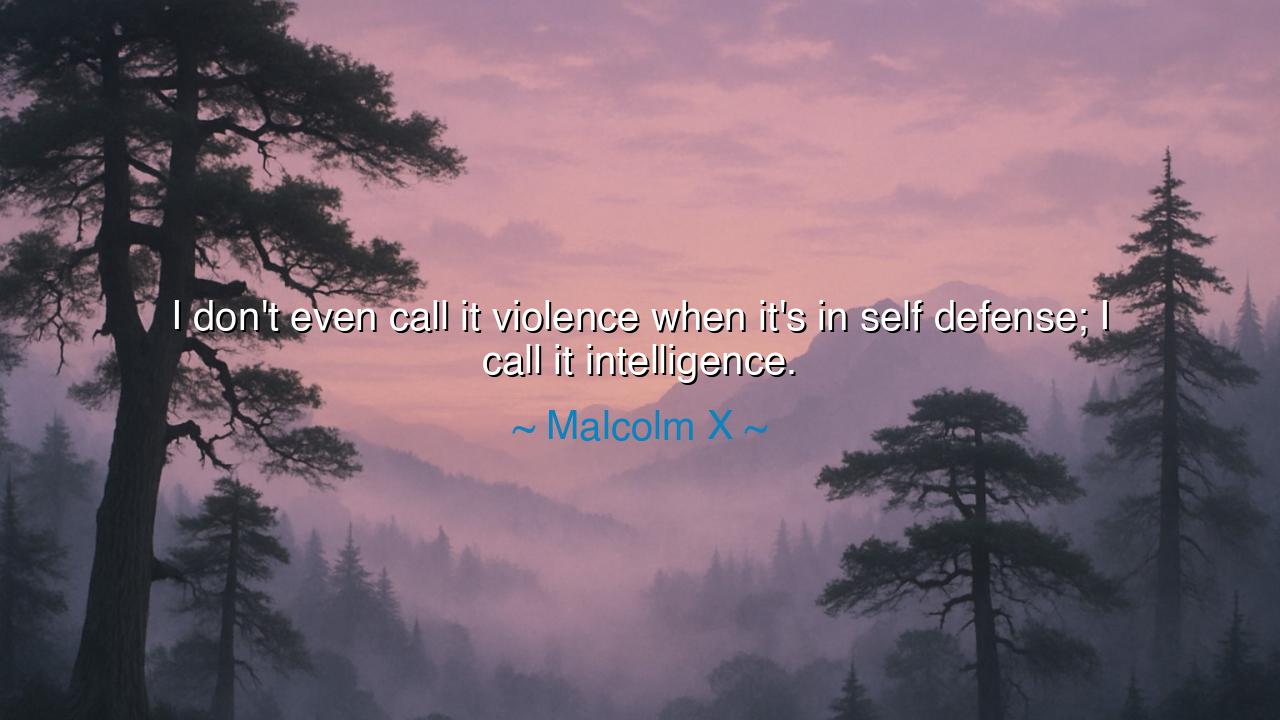
I don't even call it violence when it's in self defense; I call






“I don’t even call it violence when it’s in self-defense; I call it intelligence.” — Malcolm X
Hear now the voice of Malcolm X, a man forged in the fire of struggle, who spoke not with the softness of comfort but with the thunder of truth. His words, fierce and radiant, cut through the fog of moral confusion: when one rises to defend his life, his dignity, or his people, it is not violence, but intelligence—the sacred instinct of survival and self-respect. In a world that teaches the oppressed to bow, to turn the other cheek even when the hand of cruelty never rests, Malcolm proclaimed a higher law: that self-defense is not savagery, but the wisdom of life itself.
To understand this teaching, we must see the time from which it was born. In the dark midcentury of America, when the shadow of racism lay heavy upon the land, the people of Malcolm’s color were told to endure humiliation in silence, to suffer without resistance, to seek peace in submission. Yet what peace can exist when injustice is the air one breathes? Malcolm X, like the prophets of old, saw that a peace purchased with fear is no peace at all—it is enslavement disguised as virtue. And so he lifted his voice, declaring that a man who refuses to defend his own life has already surrendered the essence of his humanity.
In ancient times, too, men knew this truth. When Spartans stood at Thermopylae, they did not seek war, but neither did they flee it. The Persians came in vast numbers, desiring dominion, and the Spartans, though few, stood firm—not out of bloodlust, but out of intelligence. They understood that submission would destroy not only their bodies but their spirit. So they fought—not for conquest, but for defense, for the sacred right to remain unbroken. Even in death, they were victorious, for they proved that dignity defended is stronger than tyranny unchallenged.
So too did Malcolm X teach his followers that defense is the mark of self-knowledge. To refuse to be trampled is to recognize one’s divine worth. He did not glorify aggression, nor did he preach chaos; he preached balance, the equilibrium between peace and strength. He said, in essence: “I do not strike first, but if I am struck, I will not lie down.” This is the intelligence of the lion—calm in stillness, terrible in defense. It is not the mind of the brute, but the wisdom of the free man.
Yet his message was feared, twisted, and maligned, for the powerful have always preferred a meek servant to a thinking adversary. But Malcolm’s truth was too radiant to be buried. He reminded the oppressed that to love peace does not mean to accept injustice, and to resist injustice does not mean to abandon morality. For what is intelligence if not the capacity to discern when to speak gently—and when to stand firm? Violence is mindless destruction; self-defense is reason given flesh, thought made action.
Consider the lesson through the ages: when a mother shields her child, when a people rise against tyranny, when truth itself is under attack and those who love it take a stand—this is not violence, but the natural expression of life’s will to persist. It is the same force that drives the flower to break through the stone, the river to carve through the mountain, the spirit to defy its chains. Nature defends itself, and in that defense lies her deepest intelligence.
So remember this, you who walk beneath the sun: Do not mistake passivity for peace, nor submission for virtue. To defend your truth, your honor, your freedom—this is not to become cruel, but to become awake. Stand tall when the world would make you small. Protect what is sacred within you and within others. Let your strength be guided by wisdom, and your wisdom by love. For when the heart defends what is just, it is not violence, but intelligence—the highest wisdom of the living soul.






AAdministratorAdministrator
Welcome, honored guests. Please leave a comment, we will respond soon